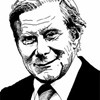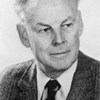Edmund Opitz has come up with the most tantalizing title of the decade, if not the century: Religion and Capitalism: Allies, Not Enemies (Arlington House, $7.00). I don’t know what I expected when I opened the book, but I was set for much more about capitalism than is to be found in Mr. Opitz’s absorbing pages. Curiously, the subject of economics takes a back seat here while Mr. Opitz endeavors, with a lucidity that recalls Lecomte du Noüy’s Human Destiny, to show that man is rooted not only in a natural order and a social order but also in a transcendent order which has endowed him with certain inalienable rights that are antecedent to government. Capitalism is what results when men, acting on their rights as individuals, freely deploy their workaday energies in time and space. It is an afterthought, really, in the context of Mr. Opitz’s larger theme, which is nothing less than the destiny of man.
Since I am not a theologian, I have to wrestle for my own lucidity when dealing with a du Noüy or an Opitz. I believe in the doctrine of natural rights, for I feel that I know that murder, theft, double-dealing, lying, covetousness, and private coercion are in the nature of things wrong for human beings in their relations with each other. It is as natural as blood pressure to think that my body and my substance are my own, to do with as I please if I do not invade the rights of others. And it follows that government has no more business to rob me for the benefit of others than private individuals. But no Transcendent Being has ever spoken to me out of a burning bush, so I have never been able to cite an explicit divine sanction for my credo. I have had to assume that something "out there" corresponds with my subjective thoughts — and "oughts."
Though he says that the "reinstatement" of the human mind "as an independent reality" does not by itself "verify religion," Mr. Opitz obviously thinks that any mind that can "produce order" (to use Plato’s phrase) and "know the world of extended matter… and transform it… in the light of a still more attractive and commanding good" (see Professor E. A. Burtt) has a quality that relates to divinity. The mind is not merely a part of the social order nor even of the natural order, for thoughts do not have tangible properties. They transcend the world of physics and chemistry. A scientific hypothesis must come before a scientific experiment, and a mind can make qualitative judgments, which is something that transcends science itself.
Mr. Opitz deduces from the fact of mind that humanity is involved in a radically different order that lies beyond the social and natural worlds. It is the mind within us (Mr. Opitz is chary about talking of "soul," or even the French "esprit") that enables us to make contact with the order-giving Intelligence that is "out ther." This gives rise to the religious view of things that connects rights with God’s commandments, as quintessential in the Decalogu.
The History of Human Rights
If this gets a little tenuous for one who has been brought up in a secular world, one can take a second breath and follow Mr. Opitz through history. Mr. Opitz compares the world’s great cultures. Where rulers have been considered the agents of God and the custodians of permissions and privileges (sometimes miscalled rights), the results have been bloody tyrannies. But where rights have been considered as something antecedent to government, liberal orders have been created, scientific discoveries have flourished, and production has risen as free individuals have competed to suggest the best economic disposition of scarce means.
The Stoics talked about natural law, but it was Christianity, with its distinction between what was God’s and what was Caesar’s, that gave the real impetus to Western man’s quest for a political order that would respect the rights that are antecedent to government. If natural — or God-given — rights exist, there are some things which are beyond the competence of the state to tamper with or alter by legislation. It does not matter whether the state is run by a monarch, an oligarchy, or by the "sovereign people." It is just as wrong for a majority of 51 per cent of the voters to kill or despoil individuals as it is for a dictator to do it.
When Christendom was synonymous with the culture of the West, it was easy to argue that God was the author of the individual’s inalienable rights. This sufficed to topple kings. The American colonists, church-goers, and Bible-readers for the most part, could follow the Founding Fathers when they wrote the theory of natural rights dependent on "nature’s god" into the Constitution, with its appended Bill of Rights.
"Consent of the Governed" Leads to the Welfare State
But with the continuing secularization of the world in the late eighteenth and nineteenth centuries the religious sanction has lost its compelling character. We now talk more about the "consent of the governed" than we do about "inalienable rights." Locke, a split character who had traced the origins of rights to a mythical prehistoric "social compact" but who had also said that nobody was justified in interfering with a person’s property or hope of Heaven, helped topple King James II, but what Britain got in the place of a divine-right monarch was a "tyranny of the majority" in parliament.
So today the "immemorial rights of Englishmen" have been sadly undermined by the "consent of the governed" to whatever parliament has cared to decree by sometimes narrow voting margins. The Englishman’s home is no longer his castle, the first call on his income belongs to the Welfare State, and he has the devil of a time getting foreign exchange for travel. No "inalienable rights" in a secularized London.
And, as Mr. Opitz makes plain, we in the United States are going the same rout. In the economic world the destruction of the doctrine of rights has resulted in a pervasive trend toward statism. Capitalism could flourish in a Christian order in which men were free to make their own decisions — and their own mistakes. But it cannot flourish in an order which regards rights as subject to infringement by "the people," who can become pretty covetous when the Decalogue "shalt not" about covetousness is no longer considered a moral law that corresponds with a command from "out there." When rights are subject to the will of 51 per cent, a majority will rob a minority blind.
The Voluntary Way
Mr. Opitz’s work is studded with brilliant perceptions that would grace a book of aphorisms. The opposite of majority rule, he says, is not minority rule, it is individual liberty. The members of our self-chosen intellectual elite, he notices, regard the common man as the embodiment of superior political wisdom, yet (see Kenneth Galbraith) consider this same common man as "incompetent to select his own toothpaste." As for free choice in economic as in other matters, Mr. Opitz observes that "the God who gave us inwardly such complete freedom that we could either accept or reject Him" would hardly fail to will "that the relationships between men should be voluntary." The Fall in the Garden of Eden — or "original sin" — made government necessary, but, says Mr. Opitz, it does not follow from this that "governmental action" is the proper remedy for sin. The business of government is to repress criminals and to prevent destructive actions, leaving men free to act constructively and creatively for themselves.
Mr. Opitz says relatively little about capitalism as religion’s "ally," for his prime concern is with the ends of human life, not its means. (He does, in passing, expose the illogical nature of Christian Socialism.) Economics, of course, is a science of means. Capitalism is the science of means as exemplified in its free operation. The "means" can’t operate as an "ally" if the ends of freedom are destroyed. Mr. Opitz is all for a libertarian economics, and for the capitalist order, but economics, as he puts it, "is only a part of lif." It is not enough to defend capitalism as such if you want to save it; it will save itself if the idea of inherent rights is revalidated, which Mr. Opitz has taken it as his task to do.


